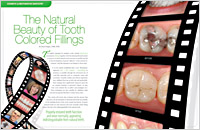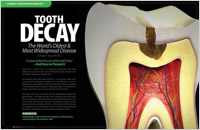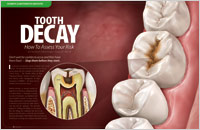Porcelain Onlays

An onlay restoration is a custom made filling made of composite material, gold, or tooth-colored porcelain. Porcelain onlays are popular because they resemble your natural tooth. An onlay is sometimes also referred to as a partial crown. Porcelain onlays are made by a professional dental laboratory and is permanently cemented onto the tooth by your dentist.
Onlays can be utilized to conservatively repair teeth that have large defective fillings or have been damaged by decay or trauma. Onlays are an ideal alternative to crowns (caps) because less tooth structure is removed in the preparation of onlays. Onlays are essentially identical to inlays with the exception that one or more of the chewing cusps have also been affected and need to be included in the restoration.
As with most dental restorations, onlays are not always permanent and may someday require replacement. They are highly durable and will last many years, giving you a beautiful long lasting smile.
Reasons for onlay restorations:
What does getting an onlay involve?
An onlay procedure usually requires two appointments. Your first appointment will include taking several highly accurate impressions (molds) that will be used to create your custom onlay and a temporary restoration.
While the tooth is numb, the dentist will remove any decay and/or old filling materials. The space will then be thoroughly cleaned and carefully prepared, shaping the surface to properly fit an onlay restoration. A temporary filling will be applied to protect the tooth while your onlay is made by a dental laboratory.
At your second appointment, your new onlay will be carefully and precisely cemented into place. A few adjustments may be necessary to ensure a proper fit and that your bite is comfortable.
You will receive care instruction at the conclusion of your treatment. Good oral hygiene practices, a proper diet, and regular dental visits will aid in the life of your new onlay.
Related Fillings Articles
 The Natural Beauty of Tooth Colored Fillings
The Natural Beauty of Tooth Colored Fillings
The public's demand for aesthetic tooth colored (metal free) restorations (fillings) together with the dental profession's desire to preserve as much natural tooth structure as possible, has led to the development of special “adhesive” tooth colored restorations... Read Article
 What is Tooth Decay? – And How to Prevent It!
What is Tooth Decay? – And How to Prevent It!
Tooth Decay is an infection, and many people don't realize that it is preventable. This article is the first in a series about tooth decay, perhaps the number one reason children and adults lose teeth during their lifetime. Explore the causes of tooth decay, its prevention and the relationship to bacteria, sugars and acids... Read Article
 Tooth Decay – How To Assess Your Risk
Tooth Decay – How To Assess Your Risk
Don't wait for cavities to occur and then have them fixed — stop them before they start. Modern dentistry is moving towards an approach to managing tooth decay that is evidence-based — on years of accumulated, systematic, and valid scientific research. This article discusses what you need to know to assess your risk and change the conditions that lead to decay... Read Article
Back